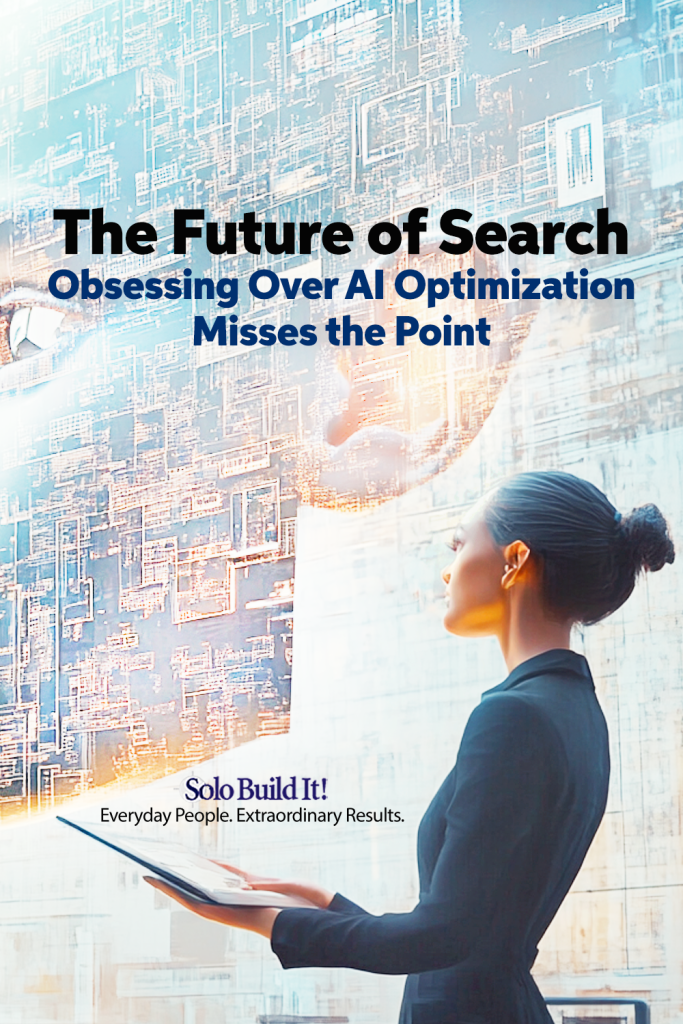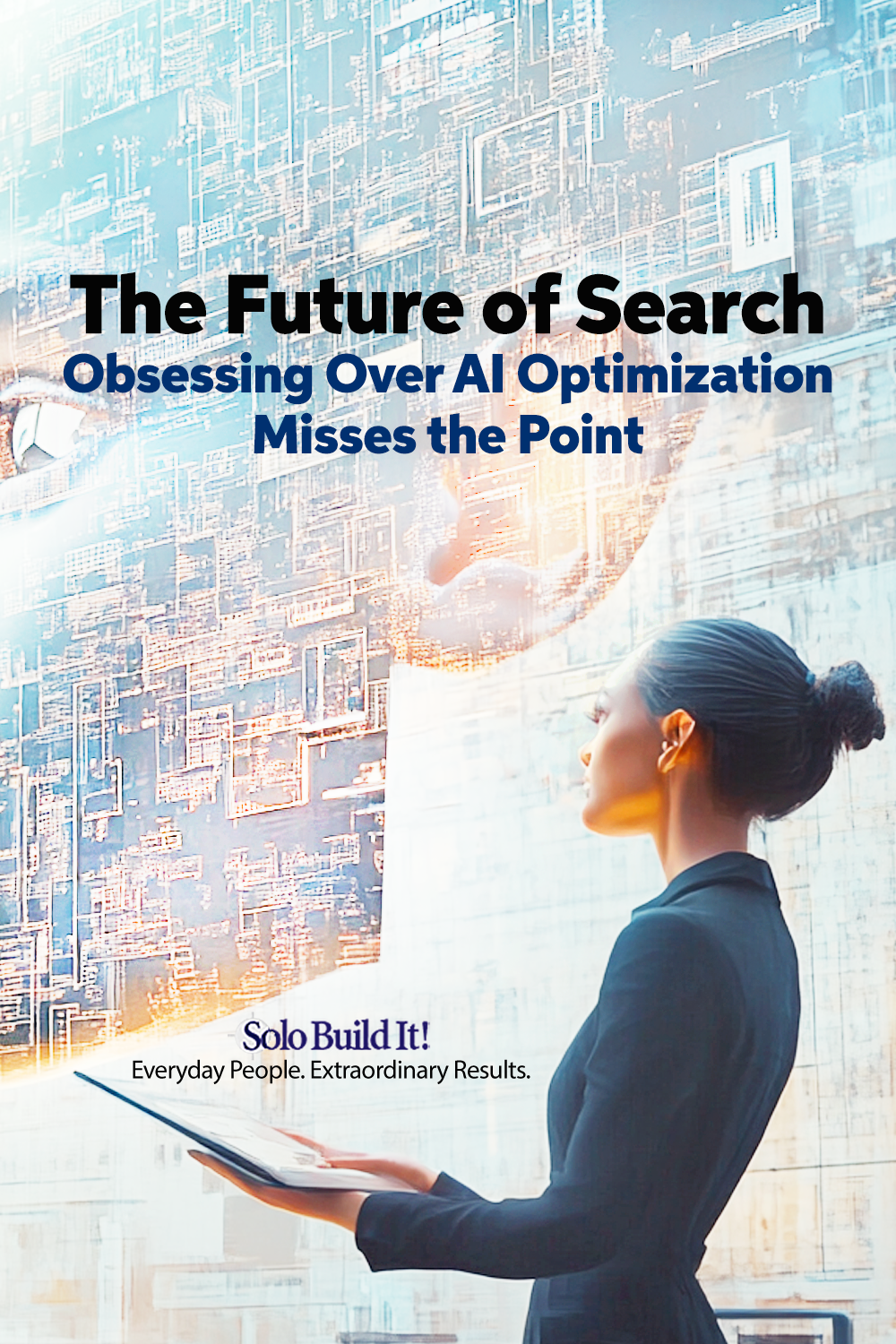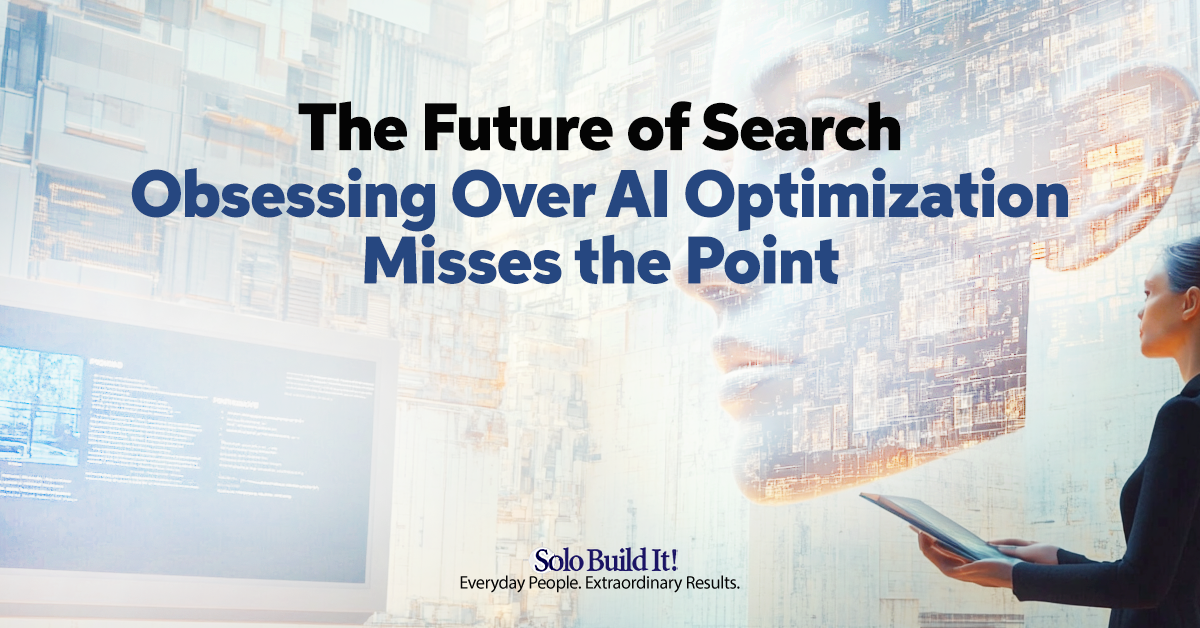In article number three in this series, we looked at how search has changed over time — from the early days of web directories all the way to the AI features we’re starting to see now. Through all those changes, your main goal as a website owner has always been the same: to write for and connect with your audience.
Now, as search technology gets more complex, ranking high at search engines paradoxically becomes simpler. That’s “simpler,” not “easier.”
To do well, you really need to get a handle on where AI is headed, especially understanding Google’s big role in all this and what things like AI Overviews will actually mean for your website. So, let’s explore what the future of search looks like.
Why Google Will Be at the Top of the AI Race
I expect Google to continue optimizing its AI search quality and how it presents AI Feature results. Expect Google to be the thought leader. Why do I think Google will push forward faster? Two reasons…
Google’s High Stakes: Why They Must Win at AI
Google’s market cap is $2.16 trillion dollars, the fifth largest in the world. Approximately 60% of its gross income comes from its core search business. This is financial risk at an order of magnitude greater than any other company.
Google’s AI Advantage: Talent, Tech & Time
Google has been the leader in AI since acquiring DeepMind in 2014. DeepMind had started in 2010, so that gave Google a head start, and a world-class AI team. Google Brain, started at Google in 2011 as a “20% time” project, ramped up and was soon doing cutting edge research.
By 2017, it was widely regarded as the most advanced AI group in the world. In 2017, it published a paper called “Attention Is All You Need.” This introduced the concept of Transformer architecture, which went on to become the foundation of all generative AI (GAI).
OpenAI was founded in 2015 by Sam Altman, Elon Musk and others, when they realized that this was the future. They recognized the importance of the Transformer concept. By 2018, they published a report about what a Generative Pre-trained Transformer (GPT) is.
And the race was on!
OpenAI released GPT-3 to the public in November 2022. Its worldwide success took everyone by surprise because GPT-2 had been used mostly by researchers and AI enthusiasts.
Google was caught flat-footed. By the time it launched Bard (Gemini’s predecessor) four months later, ChatGPT had a lead of hundreds of thousands of users.
Google plodded along after its launch of Bard. Its extreme cautiousness (fear of making mistakes) and rigid practices slowed it down.
Since then, though, it has adapted to OpenAI’s pace. OpenAI remains ahead, but you can almost feel Google’s momentum machine steadily catching up.
Let’s fast-forward from that momentous event of 2022 to April 2023, when Google Brain merged with DeepMind, forming “Google Deepmind.” The goal was to create increased efficiency and to accelerate AI research and development.
Bringing the two teams together carried other synergies, as well. They formed the strongest team of brilliant AI researchers in the world.
No other company has the historical strength nor the depth of world class AI engineers. Google’s AI efforts deserve deep respect, even if OpenAI has garnered most of the publicity.
The only way that Google loses this race to OpenAI will be because of OpenAI’s superior marketing. Wait, let me say that in a different way… because of Google’s terrible marketing.
Google’s Present and Future with AI
The Drive for Dominance: Google’s AI Motivation
Not only does Google have the resources to get this right, it has a financial motivation to maintain or grow its share of AI search functionality.
That’s why Google is experimenting so aggressively on AI Overviews. The goal is to maintain, or even grow, its 90+% market share of search. Like Microsoft, Google is integrating its AI into Gmail, Google Docs, Google Sheets, etc.
For Google, the huge prize is to hold search share. Similarly, Microsoft will valiantly defend its Office software suite through AI integration, where it holds the commanding share.
How Strong is Google’s Distribution Power?
These figures say it all…
AI Overviews initially (in beta or as Search Generative Experience) displayed in 80% of all Google searches. That figure has dropped from those mid-April 2024 numbers to around 27%, and is currently (May 2025) back up at around 40%. You can check the numbers for yourself at this free AI Overview tool.
That’s why you may see AI Overviews for a given search, while someone else doesn’t, or while it appears for one search, but not for another. Google simply doesn’t need more than that to test scores of ideas at a time.
Meanwhile, by keeping distribution “limited” (by Google’s standards), it prevents an embarrassing mistake from spreading around the globe.
- are way over-exaggerated. Consider the numerator (reported bad answers) and divide by the denominator (completed prompts). If the answer is more than 0.01%, I’d be stunned.
- have often been manipulations by those with agendas. Yes, it’s still possible to generate embarrassing answers by leading that innocent little GAI down the garden path of heavy context, until the person finally gets crazy responses.
These “meme-ers” don’t say how they did it in a way that others can reproduce. That would expose the truth. Suffice it to say that there’s no way you would ever accidentally wander down these carefully manipulated garden paths.
So, depending upon how much exposure Google gives AI Overviews, you may or may not notice traffic changes from it. Regardless, until Google is satisfied that AI Overviews is working well, don’t expect much consistent traffic from AI Overviews.
What Are SEOers Doing?
Why Obsessing Over AI Changes Misses the Point
Many SEO experts spend huge amounts of time tracking and reporting on those changes. If ever there was a “forest for the trees” example, it’s modern-day SEO voodoo.
Most of it is of little import to site owners because…
- You won’t change your content to chase after this stuff.
- The LLMs (Large Language Models) will master recognizing content quality in the not-too-distant future.
- Even now, it doesn’t matter for site owners because
1) AI Overviews is not used by many people, and2) Google is still testing AI Overviews.
A Look at Google’s AI Overviews Testing Strategy
Here are some examples of how Google optimizes results through experimentation…
- Test more concise presentations on a smaller on-page size (i.e., reducing vertical real estate).
- Use it for certain types of questions, not for others.
- Change SERP and/or AI Overviews configuration for other page element placement, especially to make room for ads (i.e., within the AI essay itself). The idea, of course, is to optimize ad income.
- Reduce the risks of publicly visible incorrect answers.
- Optimize for specific industries. Every industry has its own dynamics and lingo. This is an important part of maximizing ad income.
- Experiment with totally new formats. I can’t imagine what this might look like, nor would there be any point to doing it, even if I could. But I wouldn’t dismiss the possibility of Google developing a radical new way to increase ads, decrease pushback against the ads, increase click-through, and increase the advertisers’ ROI. WIN-WIN-WIN.
What Fluctuating AI Traffic Really Means for the Future of Search (Hint: Not Much, Yet)
Here’s the most relevant point for you regarding all this experimentation…
You may not see much, if any, traffic from it. If you do, you’ll see fluctuations in traffic. This will happen until Google has determined its best user-satisfying and income-earning placements in its SERPs.
A traffic gain or loss from AI Overviews does not mean that Google is upgrading or downgrading your site’s content. It means it’s experimenting for the short-to-medium term.
Forget AI Tracking, Instead Focus on the Core Strategy That Still Wins
In the longer term, I just can’t see Google continuing to make it so hard to use AI Overviews once it’s confident in how well these overviews are working. Also, expect AI Overview’s format to change over time, perhaps closer to that of Microsoft (Bing), or to a radically different format.

For now, it’s unlikely that any significant Google traffic loss comes from AIFs. They just aren’t seen by enough people yet. That will change, but none of it matters for you because your best strategy is still to make your content as good as humanly (that’s you!) possible.
These are early days in our transition to AI in every industry, including search. Forget about this being “the first inning” of the metaphorical baseball game. However, continuing with that metaphor…
The first batter of the top of the first inning has only seen two pitches!
Like any transformational new technology, from fire to electricity to the web, usage and formats will change greatly. The first-generation implementations are immediately obvious. It’s the next ones that accelerate everything. Translating that to today…
Consider the wide variety of how the major LLMs (e.g., ChatGPT, Gemini, Claude, Perplexity) present their ad-free organic results. They still need to figure out the best-paying ways to blend in their advertising, each varying according to the organic presentation. It will likely be 6 to 12 months before this all settles down. In short…
“You ain’t seen nothin’ yet.”
Given the volatility of changes of all kinds and that some features, such as Google’s AI Overviews, are not sending much traffic, it would be a waste of time to make changes specifically for a single feature.
The bottom line for right now, and forever (which I suspect will be more and more valid) is: Simply stick with what you’ve been doing already. Create the most informative, high-value content that OVERdelivers on search intent.
What stands you in good stead for regular search, should also work well for AI features.
This is all the more true as we’re seeing a trend towards better source citation across all major AI tools, including Google’s AI Overviews and Gemini. Driven by user demand for verification and the need to reward creators, this ‘payback’ via links is improving. And that improvement further validates the long-term strategy of creating outstanding content.
So even though “You ain’t seen nothin’ yet”…
You don’t need to worry, track or react to AI Features, like AI Overviews, for now.
How Can AI Features Generate Traffic for You?

Google’s AI Overviews and Microsoft’s CoPilot both use their underlying generative AI technologies (Gemini and ChatGPT, respectively) to generate answers, synthesizing all that they “know” into summarizing essays, with the 10 blue links below the essay.
These are the 10 highest quality and most relevant web pages on the topic, as determined by the ranking algo of each engine.
Generative AI delivers answers on the fly, i.e., it doesn’t save its answers. That’s why answers will change somewhat from query to query. For example, if I were to write content for a web page about “Cheap Anguilla villas,” and then do it again the next day, the two essays would be similar, but not identical.
On the other hand, regular search’s 10BLs won’t vary until the next algo release. Google, and every other search engine, delivers the same “top 10” for the same query, every time (until the next algo update).
What’s the smart traffic-building takeaway from these simple facts? It makes little sense to develop specifically for AIFs. They change too quickly, and, in any event, the SBI!/Tai process for creating content covers you well.
SEO vs. AIO — What’s the Difference?
“AIO” stands for “AI Optimization,” and could also be used for “AI Overviews.” We’ll generally use it to mean “AI Optimization.” I prefer to write out “AI Overviews,” just to avoid any confusion (on my part, not yours).
The Myth of AIO: Can You Really “Optimize” for AI Overviews Links?
So… what’s the difference between SEO and AIO?
I’ve already seen SEOers promote AIO tactics for how to be chosen as one of the links provided by Gemini in AI Overviews. That’s incredible…
Aren’t they aware that the entire human knowledge-base of everything since the beginning of time has been sucked into the “data vacuums” called Gemini and ChatGPT, etc.? And that it’s not an algorithm that drives this AI search?
Do they realize how rapidly AI is going to improve in the coming months? The ability to manipulate SERPs using SEO is already at an all-time low — it’s going to zero for both AI Overviews and standalone AIP (Gemini, ChatGPT and Claude). All in all, it’s fair to say that…
Beating AI search by specific AI optimization techniques is impossible.
The Power (and Unpredictability) of AI Search Engines
AI Overviews provides more accurate and relevant answers, and it can go deeper in any direction you choose. It works well for both simple and complex queries.
Smartphones will actually be “smart”! Imagine asking your iPhone or Android whatever question pops into your mind. This could change my prediction regarding how long AI as a smart search engine could take to substantially impact Google’s 10BL search product.
It will continuously learn and improve from user interactions (learning you, basically), enhancing the accuracy and relevance of the answers for you over time.
Not all searches will trigger an AI Overviews response. For example, Google claims AI Overviews will be used to answer more complex questions where it can add value beyond traditional search results. If it figures that the old-fashioned 10BL format will do a better job, it’ll stick with that.
The Bottom Line: Focus on Quality Content, Not AIO
In general, AI Overviews and Gemini impact informational content more than transactional content. And you can’t beat it with AIO. Finally, AI Overviews cites top-ranking sites that contribute to the search answer. The bottom line is simple…
Don’t waste your time on AIO as a separate strategy to learn. If you generate high rankings at regular search, you’ll receive your fair share of citations in AI Overviews.
Stay on top of AI developments and how they impact you as a blogger or online business owner. Subscribe to our free newsletter, and never miss a new article.
Subscribe For Free
Read Other Articles in This Series:
Ken Evoy Releases New Book to Help Website Owners Recover from Google Updates
Beyond the Helpful Content Update: The Real Lessons Google is Teaching Us About the Future of Search
Large Language Models: What Content Creators Need to Know
Understanding the 3 Phases of Search: A Guide for Website Owners




